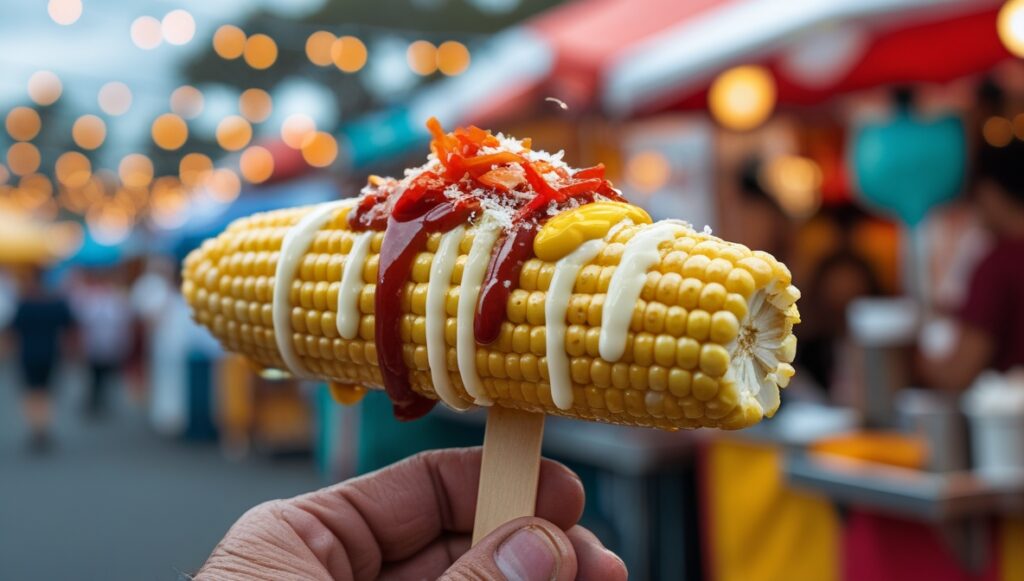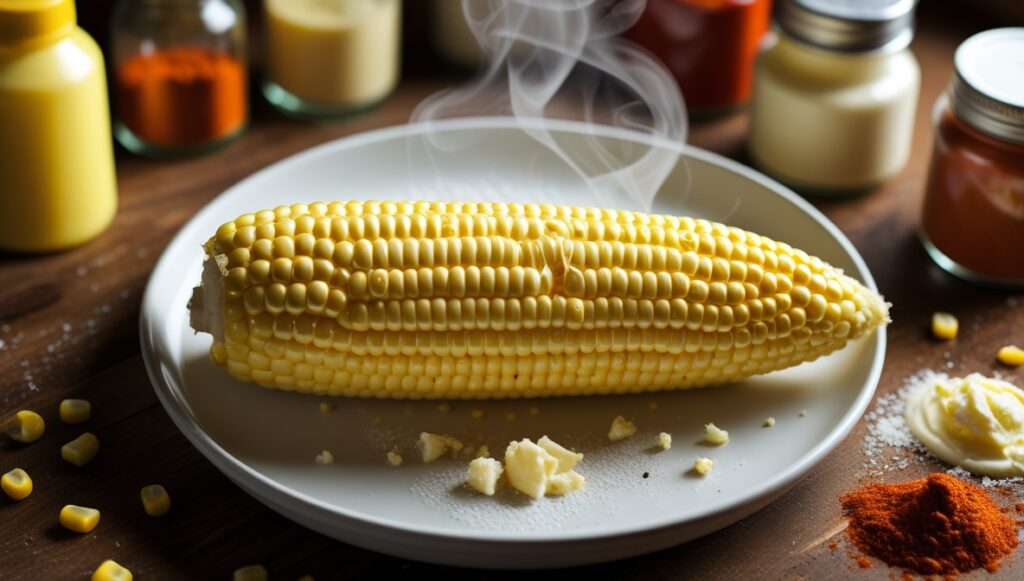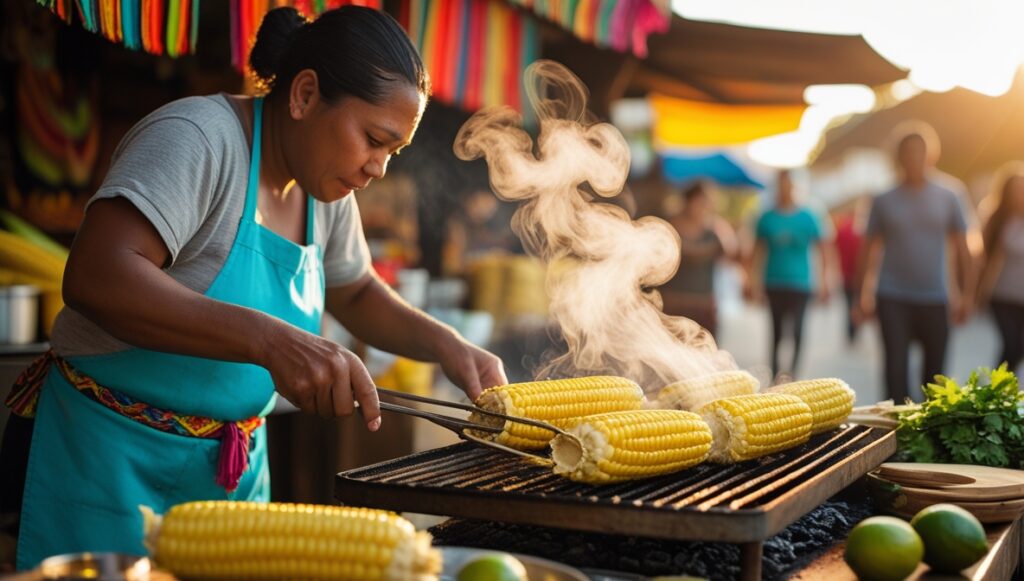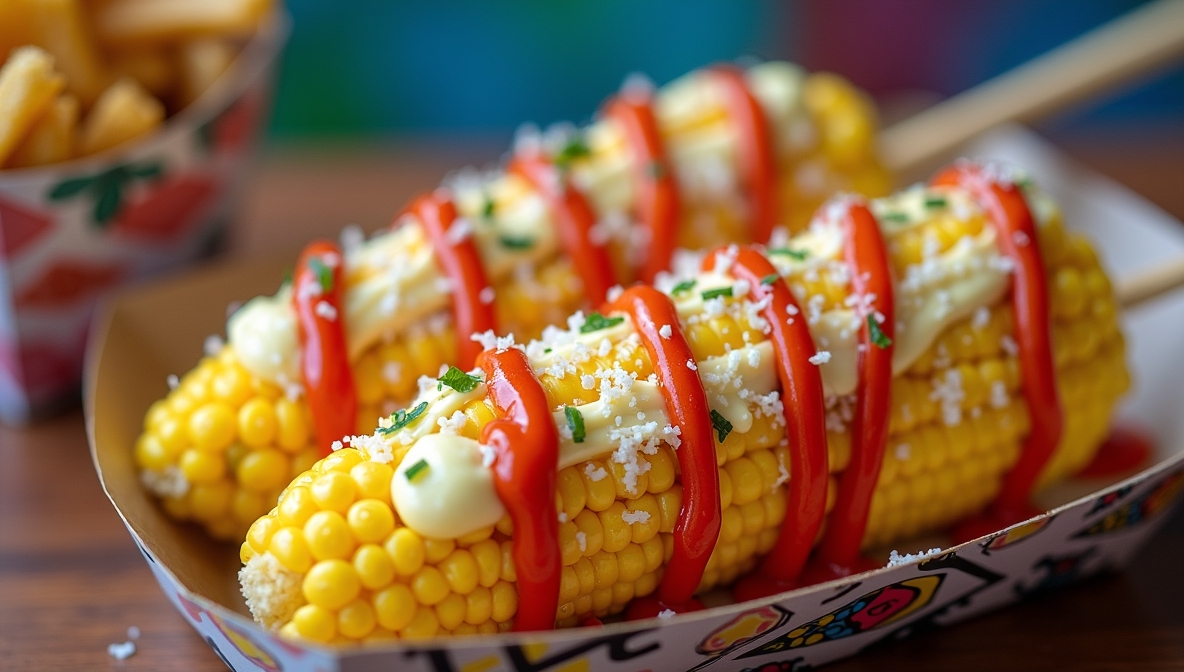Introduction
Elote Loco, often referred to as “crazy corn,” is a staple of Traditional El Salvador Food. This flavorful street snack transforms corn on the cob into a savory-sweet delight coated in mayonnaise, ketchup, mustard, cheese, and chili powder. Found at festivals and bustling markets, this vibrant dish is a celebration of Salvadoran street culture.
More than just food, Elote Loco is an experience – bold, messy, and irresistibly fun, making it one of the Famous Foods in El Salvador.


History & Cultural Significance
Corn has been central to Mesoamerican civilizations for centuries, but the modern-day Elote Loco emerged as a street food favorite in the late 20th century. Its appeal lies in how it creatively reimagines a humble cob, combining tradition with bold flavors.
Popular during national holidays, school fairs, and religious festivities, this dish embodies the festive spirit of Traditional El Salvador Food.
Ingredients & Regional Variations
Core Ingredients:
Boiled or grilled corn
Mayonnaise
Ketchup & mustard
Hard grated cheese (like Parmesan or Cotija)
Chili powder or hot sauce
Regional Twists:
Coastal versions may include lime or seafood flavors
Some variations swap mayo for sour cream or add crushed chips for texture
Modern Styles:
Vegan-friendly with plant-based sauces
Gourmet with aioli or smoked paprika
Esquites-style served in cups
Whether traditional or modern, each version of Elote Loco adds to its appeal as one of the most Famous Snacks in El Salvador.
Cooking Process & Difficulty Level

Skill Level: Easy
How to Make It:
Boil or grill the corn.
Insert a skewer or corn holder.
Spread mayo over the cob.
Drizzle ketchup and mustard.
Sprinkle with cheese and chili powder.
Pro Tip: Use fresh corn and balance the sauces to avoid overpowering the corn’s natural sweetness.
Where to Eat Elote Loco in El Salvador
If you’re wondering Best Place to Try Elote Loco, head to these iconic spots:
Paseo El Carmen (Santa Tecla): Lively food stalls serving local street eats
San Salvador Central Market: A go-to for traditional recipes
La Feria de Agosto: Try the festival-style version among the crowds
These places showcase authentic flavors, often considered the Best Elote Loco Recipe in action.
Ideal Pairings & Side Dishes
Drinks to Pair:
Fresh horchata
Tamarindo juice
Local sodas like Kolashanpan
Great Side Dishes:
Pupusas for a filling combo
Fried plantains
Pickled cabbage (curtido)
These additions make enjoying Elote Loco even more satisfying.
Fun Facts & Trivia
Its colorful sauces often reflect the Salvadoran flag.
Though it shares roots with Mexican elote, the sauce combo is uniquely Salvadoran.
Some Salvadoran celebrities proudly name it their favorite childhood snack.
It’s no wonder Elote Loco stands out among the Famous Foods in El Salvador.
Nutritional Aspects
Though indulgent, Elote Loco offers:
Natural fiber and carbs from corn
Calcium from cheese
Healthy fats in moderation
Health-Friendly Options:
Vegan versions with dairy-free cheese and mayo
Gluten-free by nature
Not keto, due to the corn base
Best Elote Loco Recipe to Try at Home
You’ll Need:
4 corn cobs
½ cup mayonnaise
¼ cup ketchup
¼ cup mustard
½ cup grated Parmesan or Cotija
Chili powder
Skewers
Instructions:
Cook corn (boil or grill).
Insert skewers.
Spread with mayo.
Drizzle ketchup & mustard.
Add cheese and chili powder.
Serving Tip: Serve hot and adjust spice level to your taste!
Global Influence & Fusion Variants
Thanks to Salvadoran communities abroad, Elote Loco has inspired global twists:
Corn pizza topped with creamy sauces and cheese
Taco fillings using grilled corn
Loaded nachos with Salvadoran toppings
These creative spins help it gain popularity beyond its borders.
Comparison with Similar Corn Dishes
Elote Loco (El Salvador)
Uses: mayonnaise, ketchup, mustard, cheese, chili powder
Served: On the cob, skewered
Taste: Creamy, tangy, slightly spicy
Distinction: Combines multiple sauces for a bold, layered flavor
Cultural Note: A staple of traditional El Salvador food and popular at fairs and street stalls
Mexican Elote (Mexico)
Uses: mayonnaise or crema, lime juice, Cotija cheese, chili powder
Served: On the cob, skewered
Taste: Creamy, tangy with a citrusy kick
Distinction: Lime juice is essential; doesn’t typically include ketchup or mustard
Cultural Note: Very popular in Mexico; often sold by street vendors as well
Esquites (Mexico)
Uses: Corn kernels, crema or mayonnaise, cheese, lime, chili powder
Served: In a cup
Taste: Creamy, spicy, and citrusy
Distinction: Off-the-cob version of Mexican Elote
Cultural Note: Easier to eat on the go; common evening street snack
Corn on the Cob (USA BBQ-style)
Uses: Butter, salt, sometimes herbs or cheese
Served: On the cob
Taste: Buttery, savory, simple
Distinction: No sauces, often grilled
Cultural Note: Common at barbecues and fairs; focuses on natural corn flavor
Choclo con Queso (Peru/Bolivia)
Uses: Large-kernel Andean corn (choclo), served with fresh cheese
Served: On the cob, sliced or whole
Taste: Mild, starchy with salty cheese contrast
Distinction: Very minimal seasoning, highlights corn’s natural taste
Cultural Note: A traditional side or snack in the Andes region

